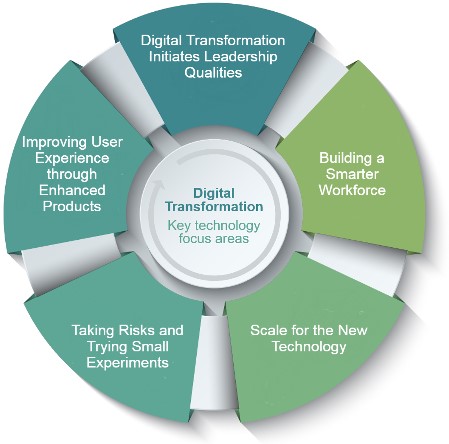Digital Transformation Solutions: Initial Steps Before Implementing


Digital transformation is the process of leveraging digital technologies to revolutionize a business or organization. It aims to improve customer experiences, optimize business processes, and achieve growth. The importance of digital transformation must be emphasized in today’s ever-evolving digital landscape. However, embarking on this journey requires significant planning, strategy, and commitment. This blog will discuss some initial steps businesses should take before implementing digital transformation solutions.
Understanding the Target Audience and Establishing Connection
The first step towards digital transformation is understanding the target audience. It involves gathering data on their preferences, behavior, and needs. Without a clear understanding of the target audience, delivering relevant and personalized experiences that resonate with them is challenging.

Businesses need to connect with their target audience, understand their pain points, and leverage digital solutions to address their needs. It identifies customer channels to interact with the brand and optimizes them for seamless customer experiences. Establishing an emotional connection with customers is also critical in building brand loyalty and advocacy.
Digital Transformation Initiates Leadership Qualities
Digital transformation involves a significant shift in mindset and culture. Leaders must be at the forefront of this shift, leading by example and empowering their teams to embrace change. They must have a deep understanding of the potential benefits of digital transformation and be able to articulate it to their teams.
Leaders must also create a sense of urgency and drive the digital transformation agenda throughout the organization. They should allocate resources, establish timelines, and hold themselves and their teams accountable for delivering results.
Improving User Experience through Enhanced Products
Digital transformation provides an opportunity to improve user experience through enhanced products. Businesses can leverage digital solutions such as mobile apps, chatbots, and social media to deliver personalized experiences that meet the evolving needs of their customers.
Businesses must also optimize their websites and other digital channels to improve the user experience. In addition, it invests in user-friendly interfaces, providing relevant content, and streamlining processes to make it easier for customers to interact with the brand.
Building a Smarter Workforce
Digital transformation requires a skilled workforce that can leverage technology to deliver value. Businesses must invest in upskilling employees and creating a culture of innovation and continuous learning.
Businesses must also identify the skills gaps within their teams and hire or partner with experts to fill those gaps. Moreover, It helps recruit individuals with data analytics, artificial intelligence, and cybersecurity skills.
Taking Risks and Trying Small Experiments
Digital transformation requires taking risks and trying small experiments. Businesses should adopt a “fail fast, learn faster” mindset, where they experiment with different solutions and learn from the outcomes.
Businesses should focus on identifying low-risk opportunities to test digital solutions and learn from them. It could involve piloting new solutions with a small group of customers, testing campaigns, or experimenting with new business models.
Scale for the New Technology
Finally, businesses must scale their digital solutions for long-term success. Scaling requires a holistic approach that involves integrating digital solutions into the existing business processes. It builds the necessary infrastructure and aligns the organization’s culture and mindset.
Businesses must also measure the influence of digital solutions and continuously iterate to improve their outcomes. However, it leverages data analytics to track performance, determine major areas of improvement, and make necessary adjustments to improve results.
Get more info: Industry-Specific Tech Stacks That Are Highly Recommended For Digital Transformation Solutions
Importance of Digital Transformation
Digital transformation is a journey that requires significant planning, strategy, and commitment. By understanding the target audience, initiating leadership qualities, improving user experience through enhanced products, building a smarter workforce, taking risks, and scaling for new technology, businesses can set themselves up for success in the digital age.
Businesses must adopt a customer-centric approach to digital transformation and focus on delivering relevant and personalized experiences. It helps to meet the evolving needs of their customers. It’s also important for businesses to embrace a culture of innovation and continuous learning. Where they are willing to take risks, challenges and experiment with new solutions.
Digital transformation requirement is not a one-time project but a continuous process that involves ongoing investment and commitment. Businesses can stay competitive in today’s digital landscape by leveraging digital technologies to optimize their operations, improve customer experiences, and drive growth.
However, businesses need to approach digital transformation strategically and not simply adopt new technologies for the sake of it. Following the initial steps outlined in this blog, companies can lay the foundation for successful digital transformation that delivers long-term benefits.
Conclusion
In summary, digital transformation is leveraging digital technologies to revolutionize a business or organization. By understanding their target audience, initiating leadership qualities, improving user experience through enhanced products, building a smarter workforce, taking risks, and scaling for new technology, businesses can set themselves up for success in the digital age.
Companies must adopt a customer-centric approach to digital transformation and focus on delivering relevant and personalized experiences that meet the evolving needs of their customers. It’s also important for businesses to embrace a culture of innovation and continuous learning, where they take risks and experiment with new solutions.
At MMC Global, we build flexible and scalable solutions that can integrate with new technologies and platforms. We also ensure that their digital transformation solutions are sustainable and easily maintained over time. It requires careful planning and a professional team that we have owned to build the right infrastructure and technologies.
We also consider the ethical implications of digital transformation solutions. Companies must respect customer privacy and comply with data protection regulations as more data is collected and analyzed.
Digital transformation can revolutionize how companies operate, interact, and deliver value. However, implementing digital transformation solutions is more than just a one-size-fits-all approach. Companies need to take the time to understand their target audience, develop strong leadership qualities, focus on enhancing the user experience, build a smarter workforce, take risks and try small experiments, and plan for scalability and sustainability.
By following these initial steps, companies can lay a strong foundation for digital transformation and increase their chances of success. It is important to ensure that digital transformation is a journey, not a destination, and companies need to be willing to adapt and evolve.



